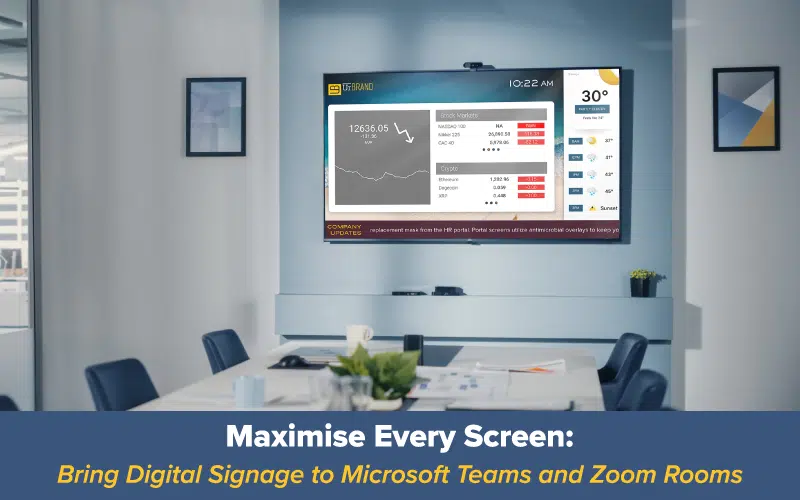Windows 7, 8, 10, or 11? Reducing Cyber Vulnerability by Keeping Software up to date
Most organizations have screens in every meeting room – but what happens when they’re not in use?
In today’s hybrid workspaces, Microsoft Teams Rooms and Zoom Rooms are everywhere. They’ve become essential tools for collaboration, yet the screens powering them often sit idle when not in use – a missed opportunity to communicate, engage and support your workforce more effectively.
That’s why Uniguest has added support for digital signage playback within Microsoft Teams and Zoom Rooms – turning those screens into dynamic communication tools when not in a call or presentation.
Make Every Screen Count
With this new feature, businesses can make better use of existing room displays by using idle time to show:
- Internal comms and company news
- Branded welcome messages or event takeovers
- Real-time updates or alerts (e.g. fire alarms, changes to office access)
- IT tips and reminders on how to connect or use the room
- Meeting room-specific info like booking status or talking points

It transforms underutilised AV infrastructure into a powerful channel for on-site engagement.
Built to Support IT and Facilities Teams
This feature doesn’t just benefit end users – it’s a practical solution for overstretched IT and facilities teams too:
- Fewer support tickets: Help users connect and present with on-screen guidance
- Personalised experiences: Welcome VIP guests or display tailored room branding
- Operational efficiency: Push out daily information, policies or safety updates without printing signs
The ability to remotely manage messaging across all rooms – from a single platform – reduces admin time and enhances the workplace experience.
A Win for Corporate Clients and Channel Partners
For corporate and enterprise IT and AV teams, this capability unlocks greater value from their investment in Teams or Zoom Room technology. It’s a simple way to extend digital signage reach without buying new screens or deploying a separate platform.
It’s also a strong selling point for channel partners delivering Microsoft and Zoom Room installations. Many already have customers looking to personalise and improve meeting room usage – this gives them a clean, proven solution.
One Platform. No Duplication.
The best part? You don’t need to juggle another system. If you’re already using Uniguest’s Tripleplay platform for IPTV or digital signage, you can push content to meeting room screens from the same platform – no duplication, no new tools to learn.
That means:
- Reuse existing content without reformatting
- Centralised content scheduling and reporting
- Consistent messaging across lobbies, floors and meeting rooms
- Easy rollout across regions or offices
It’s a seamless, scalable way to increase visibility for your key messages – and make better use of screens already in place.
Built for the Hybrid Office
In a hybrid work environment, consistency matters. Teams are spread across locations, and communication touchpoints need to work harder.
By extending signage into Teams and Zoom Rooms, businesses can ensure critical messages reach people wherever they are – not just in reception or the canteen. Whether it’s office etiquette, wellbeing reminders or key company news, this feature helps reinforce messaging in the moments that matter.
Want to make more of your Microsoft Teams and Zoom Room screens?
Talk to us about activating signage playback across your meeting spaces.